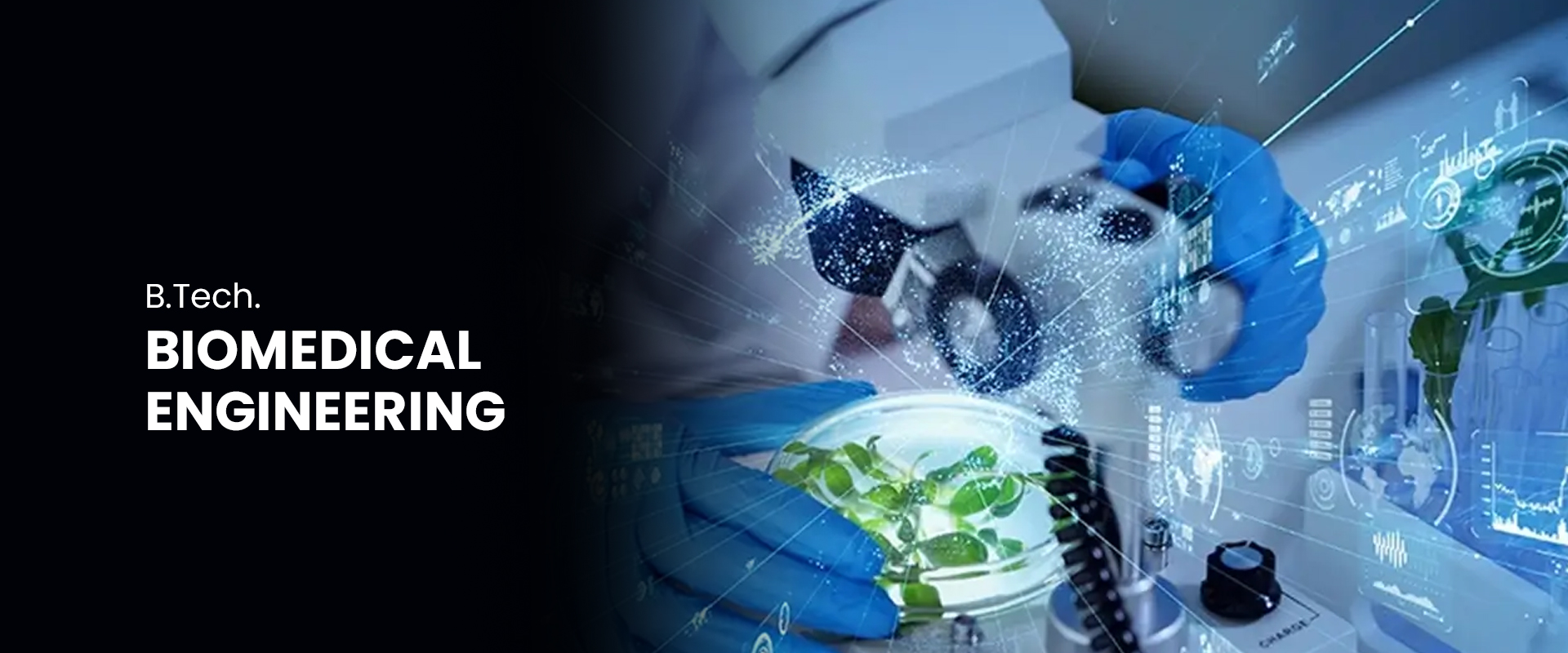
About Biomedical Engineering
Career Opportunities in Biomedical Engineering

Biomedical Engineer
Biomedical engineers are tasked with designing and engineering solutions to medical problems with the help of technology. These professionals create well-researched equipment that can help aid the healthcare industry.

Biomedical Research Scientist
Biomedical research scientists conduct cutting-edge research and develop solutions for medical problems using engineering technology. Some of the examples of biomedical engineering marvels are robotic limbs, dialysis machines, x-ray machines, etc.

Product Development Engineer
Product development engineers work closely with biomedical research scientists to design, test, and develop equipment that uses the principles of engineering to solve medical issues.

Instrumentation Engineer
Instrumentation engineers are responsible for designing, developing, testing, and innovating on medical instruments that are used for diagnosing and treating different issues in the human body.
 Program Structure
Program Structure
| Engilish Communication Skills | Applied Physics |
| Algebra and Differential Calculus | Environment & Ecology |
| Engineering Graphics & CADD. | Synthesis and processing of Materials |
| NSS/NCC/YRC/CLUBS* | |
| Engineering Chemistry | Technical Communication |
| Fundamentals of Electrical and Electronics Engg. | Engineering Mechanics |
| Introduction to Computing and C-Programming language | Pharmaceutical Microbiology |
| NSS/NCC/YRC/CLUBS* | |
| HSS( Foreign Language) | Transform vector Calculus and Complex variable |
| Data Structure | Medical Instrumentation |
| Circuit Theory & Networks | Electronics Device and Circuits |
| Internship I | Data Structure Lab |
| Circuit Theory & Networks | Electronics Devices and Circuits Lab |
| Microcontroller and Application | Human Anatomy & Physiology |
| Signal and System | Engineering & Managerial Economics |
| Artificial Intelligence and Machine Learning | Digital Electronics |
| Microcontroller and Applications. Lab | Digital Electronics Lab |
| Control System Engineering | Data Base Management System |
| Bioinstrumentation | Medical Instrumentation |
| Linear System and Signal Processing | Data Base Management System Lab |
| Control System Lab | Internship II |
| Digital Signal Processing | Principles of Diagnostic and Therapeutic equipment's |
| Embedded Systems in Medicine | Digital Image Processing |
| Medical Informatics and Expert Systems. | Open Elective - I |
|---|---|
| Digital Signal Processing Lab | Medical Informatics and Expert Systems Lab |
| Mini Project Seminar | |
| List of Open Elective I | |
| Sensors in Automation | Embedded Processor |
| Laser & Fibre Optics & Its Medical Applications. | Biomedical Signal Processing |
| Cloud Computing | Principals of Radiological Equipment |
| Program Elective - I | Open Elective - II |
| Biomaterials | Project Management |
| Internship - III | Cloud Computing Lab |
| Project Phase - I | |
| Program Elective - I | |
|---|---|
| Radiation and Microwave Theory |
VLSI Design |
| Open Elective - II | |
| Embedded & RTOS | Advanced Biomedical Instrumentation |
| Program Elective - II | Program Elective - III |
| Program Elective - IV | Project Phase - II |
|
Program Elective - II |
|
| Modelling of Physiological Systems | Bio - Medical Signal Processing |
| Program Elective III | |
| Program Elective - I | |
| Advance Control System | Artificial Intelligence |
| Program Elective IV | |
| Biomedical Hazards & Safety | Robotics & Automation |
Fee Structure & Eligibility
| Programme | Sem | Year | Mode | Eligibility | Academic Fees Per Year (INR) |
Special Fees (Incl. Library Fee & Examination Fees) Per Year (INR) |
Fees Per Year |
|---|---|---|---|---|---|---|---|
| B.Tech (Biomedical Engineering) | 8 | 4 | Sem | The candidates must be passed in 12th PCM/PCB from a recognised Board: Passed 10+2 examination with Physics/ Mathematics / Chemistry/ Computer Science/ Electronics/ Information Technology/ Biology/ Informatics Practices/ Biotechnology/ Technical Vocational subject | Rs. 1,20,000/- | Rs. 10,000/- | Rs. 1,30,000/- |
Note:
- Admission Form and Prospectus Rs. 1000/- (One Time).
- Caution Money Rs. 1000/-
- Hostel Fees Rs. 1,10,000/- per annum + 5000 (Deposit Rs 5, 000 at the time of Admission only on refundable basis) Minimum 4 Occupancy
- Transportation Fees as applicable based on Route and Pick Up Point.
- Uniform Cost Rs. 6000/-




